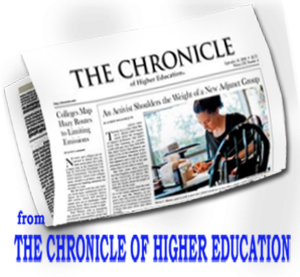Ed: Imagine a future where a politically influenced, centralized, federal bureaucracy can put its stamp on courseware that awards credit in evolution, economics or even American History.
This article in the Chronicle talks about a $2 billion dollar federal effort to develop open courseware. That effort is now underway. The proponents liken the effort to the creation of public libraries. But, onlike books, these OER are seen as offering their own credit.
That is, the program includes self testing, the ability of students to get academic credit without supervision by faculty.
The article does not mention Western Governors University or its for profit comperes. .
The potential for abuse is frightening.
May 15, 2011
One of the most innovative federal higher-education programs ever conceived.
By Kevin Carey (excerpted, emphasis added)
President Obama’s community-college reform agenda (has) one of the most innovative federal higher-education programs ever conceived. Hardly anyone has noticed.
The concept is simple: Community colleges that compete for federal money to serve students online will be obliged to make those materials—videos, text, assessments, curricula, diagnostic tools, and more—available to everyone in the world, free, under a Creative Commons license. The materials will become, to use the common term, open educational resources, or OER’s.
The open-resource movement has been under way since the 1990s, with free content distributed by institutions including Carnegie Mellon and Yale Universities, and the Massachusetts Institute of Technology. But there has never been an effort to promulgate OER’s on a $2-billion scale.
(The federal program is headed by) Hal Plotkin, a community-college trustee and veteran Silicon Valley journalist who has covered business, education, and technology for outlets like CNBC, Forbes, and Inc. Plotkin … says the program will create “the greatest expansion of access to high-quality education and job-training opportunities in the history of the world.”
Contrast that to nearly all learning materials produced by colleges today. Lectures, course notes, student work, interim test scores, group projects, papers—most of it vanishes forever into the ether, leaving nothing for future teachers and students to use, and no basis for objectively evaluating the quality of the teaching and learning that occurred. That is, perhaps, by design.
But while the availability of open educational resources has grown exponentially, the resources have had relatively little effect on the conduct of traditional higher education. In part, that’s because abundance creates its own burdens. Even mega-versities offer only one class called Psychology 101. How do you pick among hundreds? Too much choice can be paralyzing.
Traditional colleges also offer an implicit guarantee of quality that, while often hollow in reality, seems real enough to potential employers. And while Yale, MIT, and the rest are happy to let outsiders follow along and learn online, they won’t offer any course credit to non-enrolled students, regardless of how good their open courses are and how much users learn.
The $2-billion Labor-Education project could transport the open-resource movement to a new level of prominence. Because the materials will be developed under the auspices of a federal-government competition, they will carry an assumed mark of quality absent from random lectures posted on YouTube. The departments also plan to organize the materials so that educators can search and shape them into rational sequences of learning. Private companies will be able to repackage, improve upon, and sell the materials they like, as long as they acknowledge the original developers.
That still leaves the problem of credit. Public libraries were the original OER, yet people can’t demand a diploma just because they’ve learned from a book. But here, too, new developments are under way. The latest and most sophisticated open educational resources have tests embedded within them because assessment is a fundamental element of learning. Feedback-based, assessment-driven “cognitive tutors” developed by learning scientists at Carnegie Mellon are woven into science, engineering, and philosophy courses produced by the university’s Open Learning Initiative. For example, studies have shown that their online statistics course produces equal or better learning results than do traditional lectures. The same Carnegie Mellon experts will be helping the federal-grant recipients design their educational tools. Assessments create evidence. And that’s all a credit is, in the end: credible evidence of learning.
Similarly, videos produced by the free online Khan Academy include matched assessment exercises that students use to earn “badges”—academic credits of a different kind. The Mozilla Open Badges project goes a step further: It is focused on creating a new, open credentialing framework that can accommodate all manner of disciplines and professions, leaving teaching and learning to others.
These disparate elements are beginning to form an entire ecosystem for teaching and crediting human knowledge and skill, one that exists entirely outside the traditional colleges and universities that use their present monopoly on the credentialing franchise to extract increasingly large sums of money from students.
Open education has, to date, done little to puncture that closed system. Proposals for the first $500-million of the $2-billion arrived at the Labor Department only a few weeks ago, so the exact nature of the programs remains to be seen.
Kevin Carey is policy director for Education Sector, an independent think tank in Washington
